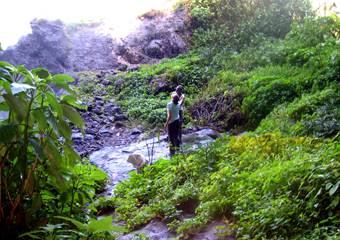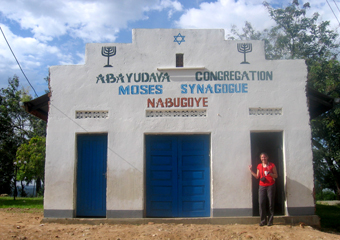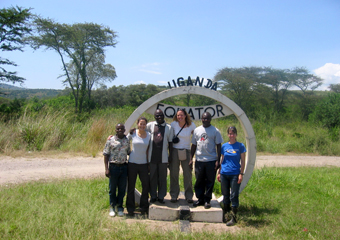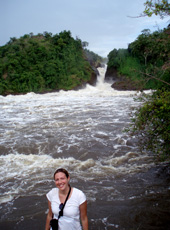Global Impact
Permanent link All Posts

Kompel hiking with Isaac (a member of the Abayudaya) in Sipi Falls
My day starts at 5:30 a.m., sipping a much-needed cup of coffee while putting on my hand wraps and waiting for my personal trainer to arrive for my daily kickboxing lesson. After an hour workout, I watch the news over a leisurely breakfast, take a hot shower and get ready for work. After a short walk in the blazing sun, I greet the security guard, turn on the computers, make some more coffee and read the paper for an hour before the others arrive. Another perfect morning in Uganda, unlike any back home in Chicago, yet completely different from what I had anticipated when I prepared for my volunteer posting in Africa.
I made the decision to volunteer overseas with American Jewish World Service (AJWS) last June. AJWS Volunteer Corps places professional Jewish men and women on volunteer assignments for two to 12 months with local nongovernmental organizations (NGOs) in developing countries. I knew I would be going through a career transition and decided to take advantage of this window of time to pursue my passion for economic development. When I found out three weeks before my scheduled departure that I would be heading to Uganda, and realized that everything I knew about the country was based on the movies Operation Thunderbolt and The Last King of Scotland, I admit I got a little nervous.
What struck me the most during my first week in Kampala, the capital city, was just how much I stood out. There were many other white people living in Kampala, but at any given moment I seemed to be the only one. It was disconcerting to be the minority—stared at, and laughed at, losing my individual identity and being called Muzungu, “white person.” I never did get used to that, but after a while, the things that seemed so strange in the beginning—boda bodas (motorcycle taxis) speeding down the bumpy roads, carrying mothers riding sideways with babies on their backs; the smell of burning garbage; hunched women sweeping dust-covered streets; complete chaos in the markets, “short calls” (quick stops to pee out in the open beside the bus); and flashing (calling and hanging up on the recipient so they call back and pay the charges)—all these became merely part of everyday life.
Having traveled through South Africa and other developing countries, I was excited to experience Uganda as a resident rather than a tourist, immerse myself in a new culture and learn about the trials of living in a poor country. I had gone to Uganda expecting to learn from these differences, but I had never put any real thought into what I would take away from the similarities. Living in Kampala, there were many similarities to America—fancy restaurants, hotels and bars, a mall and movie theater, fitness clubs, golf courses, and many others. I learned just how easy it is to make new, lifelong friends and how quickly one can change every aspect of her life if she chooses. I learned that I like being able to more fully participate in Jewish services and I reveled in being called to the Torah for the first time on Rosh Hashanah at the Abayudaya (a unique and welcoming Jewish community of approximately 800 Ugandans in the eastern part of the country).

Moses Synagogue in Nabugoye, the largest shul in Mbale
From Thanksgiving and U.S. election night to Uganda Independence Day and Eid (the festival that marks the end of Ramadan), every event brought my new mix of Ugandan, European and American friends together to celebrate. I was truly inspired by the many volunteers, expatriates and locals I met overseas. Most of my favorite people I met completely by chance. At home they would have simply come in and out of my life without further thought, as I would have been too busy to give the relationships time to develop. My fellow AJWS volunteers Laurie and Dan were newlyweds who decided to start out their life together by giving back and sharing a unique adventure. Myriam, a doctor from New York, finished residency and gave up a full-time offer to volunteer in a rural hospital for six months. Becca, an expat from Wisconsin, is working through “MBAs Without Borders” to effect positive change in East Africa. Tony, a Ugandan entrepreneur with a small but successful tour company, rescued me when I got stranded in the middle of nowhere and became a good friend, encouraging me to start my own company upon return to the States.

Kompel Standing with coworkers on the equator on our way to see the mountain gorillas in Bwindi
Before I went to Uganda, I was unsure of how much of an impact I could have in a few short months. Looking back, I implemented a financial system for an NGO that otherwise would have continued operating without one, and that is now in a position to raise larger funds more quickly to support its cause and country. I also developed strong relationships and presented myself as an American and a Jew in hopes of leaving a positive impression. At my farewell team lunch, Prossy, my good friend and counterpart, gave the most remarkable speech about what I had given to her and to the organization. In that instant, I knew that volunteering had been the right choice and that I would return to the developing world to work on sustainable economic development.
As I think about my time in Uganda and share stories of my life there, I may not mention using pit latrines, tearing my hair out on long, uncomfortable bus rides, having to look down as I walked so I wouldn’t fall into an enormous pothole, and seeing malnourished kids begging in the streets daily. It’s not that I have simply forgotten or that these things weren’t part of my reality or experience in Uganda, but mostly because that is what people expect to hear about life in Africa, and it is not the complete picture. The images that we see of Africa in the news inspire me to want to work in the global arena, but it was both the similarities and the differences that led to my own transformations. One of my first journal entries in Uganda included my frustration with how slowly people seemed to move. Walking to work on my last day, it struck me that I was the one being passed up by others taking the same route.

Kompel on safari in Murchison Falls
Rivka Kompel is a graduate of the Kellogg School of Management MBA program and the President of Verity Solutions Group, a services company focused on providing management, back office operations, and due diligence support for small to mid-sized companies. The company specializes in the real estate and non-profit industries.



.jpg)



